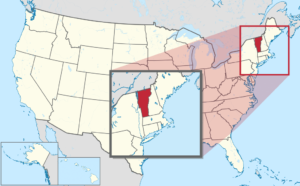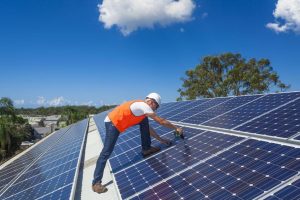 Vermont is a Northeastern state that receives subpar sunlight throughout the year. The state gets roughly 4 kilowatt-hours per square meter of sunlight per day.
Vermont is a Northeastern state that receives subpar sunlight throughout the year. The state gets roughly 4 kilowatt-hours per square meter of sunlight per day.
Even though the state doesn’t have the solar capabilities of other states like Arizona and California, it’s a leader in solar and renewable energy utilization.
The state is making sound investments that will make it an energy-independent state, focusing on renewables like solar and biomass.
The residents of Vermont are offered numerous measures to help them become energy-independent. This includes grants, incentives, rebates, and loans.
Contents
- 1 Key Takeaways
- 2 Introduction
- 3 Vermont Renewable Portfolio Standard
- 4 Federal Solar Tax Credit
- 5 Net Metering in Vermont
- 6 Vermont Tax Exemptions
- 7 Case Study: Residential Solar Installation Vermont
- 8 Expert Insights From Our Solar Panel Installers About Solar Panel Laws in Vermont
- 9 Experience Solar Excellence with Us!
Key Takeaways
- Vermont aims to generate 90% of its energy from renewables by 2050, offering homeowners incentives like grants, rebates, and loans to support solar adoption.
- The federal government provides a 30% tax credit for solar installation costs, which can significantly reduce expenses for homeowners in Vermont.
- Vermont has a robust net metering policy, allowing solar users to stay connected to the grid, earn credits for excess energy, and use the grid as a virtual battery for their solar PV systems.
Introduction
Vermont has one of the highest targets in the nation for renewable energy generation. The state aims to produce 90% of all its electricity needs from renewable means by 2050. This means all stakeholders, including homeowners, must do their due diligence to meet this goal.
Vermont has been able to set up over 100 MW of solar power. This is five times what Maine has. Solar is a viable option in Vermont because it makes a lot of money in terms of savings.
A 5 kW system is more than enough for an average household to meet the house’s daily requirements. The average cost of a solar PV that size is $15,000. Because solar PVs start generating electricity after solar installation in Vermont, it is expected you start earning savings from the onset. You can save up to $840 in the first year.
After factoring in all the tax cuts and incentives, the payback period for the system is around ten years. The short payback period can be attributed to the state’s high electricity cost.
The price of electricity is outrageously high at 17.5 cents per kWh. The average electricity price in the nation is 12.5 cents per kWh, making the electricity price 30% higher in Vermont.
The high cost of electricity is also a significant incentive for homeowners to switch to solar to save on utility bills.
Vermont is taking giant leaps to advance renewable energy generation. Its policies have led to green energy around the nation, setting a precedent for others. Here are the solar panel laws in Vermont.

Vermont Renewable Portfolio Standard
Vermont doesn’t have an ordinary Renewable Portfolio Standard (RPS). Before 2015, it was called the Sustainably Priced Energy Enterprise Development (SPEED) program.
This program stated the required percentages of renewable energy generation that utilities had to meet. This program was not punitive, and utilities were not fined if they didn’t reach their targets.
SPEED has, however, been replaced by Renewable Energy Standard (RES), which is quite similar to the ordinary RPS. The state of Vermont, through the RES, aims to achieve 90% of energy generation using renewable means by 2050. The RES also fines utilities that fail to meet their targets.
Federal Solar Tax Credit
When you buy solar PV, the federal government allows you to cut 30% of the total cost of installation from taxes. This incentive is also known as Investment Tax Credit (ITC). This is the highest savings you can receive in your quest to go solar.
Your installation’s total cost includes the solar panels, installation costs, permits, and other auxiliary components. If you pay $20,000 to install solar PV, you are entitled to a $6,000 tax credit.
You can redeem the whole amount in the first year of installation. If you do not pay enough taxes to warrant redeeming the entire amount in one year, you can split the amount over subsequent years until you are fully compensated.
The tax credit only applies to homeowners who buy whole solar PV systems at once, either by cash or through a solar loan. To reap maximum savings, it is recommended that you purchase the entire system using cash. If you are low on funds, you can take a loan, redeem the tax credit, and use the cash to pay the loan’s first installments.
Net Metering in Vermont
Vermont’s champion in the renewable energy sector has a robust net metering policy. This policy benefits homeowners by allowing them maximum value for their investment.
Net metering allows users to upgrade to solar power to remain connected to the grid. When your solar power produces more energy than your household needs, the grid adopts the extra energy to serve another load.
When you send electricity to the grid, your utility provider gives you credits that can be used to offset your bill.
When your solar panel isn’t producing enough energy to power up your household, i.e., at night or wintertime, you can draw power from the grid to meet the deficit.
The credits you have earned are netted off your consumption bill. This means you use the grid like a battery for your solar PV system.
Vermont requires that utilities charge credits at a rate close to the retail price.

Vermont Tax Exemptions
The state of Vermont exempts solar from being taxed in property taxes.
Installing a solar system increases your house’s value by an average of $15,000. Solar isn’t included when valuing your home.
The state has also exempted solar from sales tax. This means you pay for your solar PV system at a discount because of the exempted sales tax.
Case Study: Residential Solar Installation Vermont
Background
Burlington, Vermont, is known for its commitment to sustainability and renewable energy. Despite receiving less sunlight compared to sunnier states, Burlington has embraced solar energy as part of its strategy to become energy-independent. This case study highlights a successful residential solar installation project in this eco-conscious city.
Project Overview
We were approached by a homeowner in Burlington who was eager to reduce their carbon footprint and take advantage of the various solar incentives available. The primary goal was to install a 5 kW solar PV system that would meet the household’s energy needs and significantly reduce their electricity bills.
Implementation
Initial Assessment: Our process began with a thorough energy audit, analyzing the household’s historical data on electricity usage. This helped us determine the optimal system size and configuration to ensure maximum efficiency and savings.
Design and Planning: Using advanced tools, we designed a system tailored to the home’s unique requirements. This included selecting high-efficiency panels and positioning them to maximize sunlight capture throughout the year.
Installation: The installation phase was meticulously planned and executed. The solar panels were installed on the south-facing roof to optimize exposure to sunlight. We ensured all components, including inverters and mounting systems, were of the highest quality and installed correctly.
Connection and Testing: After installation, we connected the system to the grid, leveraging Vermont’s robust net metering policy. This allowed the homeowner to earn credits for any excess energy produced, which could be used to offset future electricity bills. The system was tested thoroughly to ensure it met all performance and safety standards.
Results
The solar system began producing electricity immediately, leading to significant savings from the onset. The homeowner reported a 40% reduction in their monthly electricity bills. The combination of the federal solar investment tax credit and Vermont’s property tax exemption made the financials of the project even more attractive. The payback period for the system was estimated to be around 10 years, after which the savings would significantly exceed the initial investment.
Additionally, the project contributed to Vermont’s goal of generating 90% of its energy from renewable sources by 2050. By adopting solar energy, the homeowner not only reduced their energy costs but also supported the state’s sustainability initiatives.
Summary
This residential solar installation in Burlington demonstrates the effectiveness of Vermont’s solar policies and incentives. Despite the state’s lower solar insolation, the financial benefits provided by net metering, tax exemptions, and federal tax credits make solar energy a viable and attractive option for homeowners. At Solar Panels Network USA, we are committed to delivering customized solar solutions that help residents achieve their energy goals and support a sustainable future.
Expert Insights From Our Solar Panel Installers About Solar Panel Laws in Vermont
Vermont’s robust net metering policy is a major incentive for homeowners. It allows them to offset their electricity bills significantly by earning credits for excess energy produced by their solar panels.
Lead Solar Installer
The combination of state and federal incentives in Vermont, such as property and sales tax exemptions along with the 30% federal tax credit, makes solar installations a financially viable option for many homeowners.
Senior Solar Technician
Despite Vermont’s relatively lower solar insolation compared to states like California, the state’s commitment to renewable energy through policies and incentives ensures that solar power remains an attractive option for residents.
Solar Energy Consultant
Experience Solar Excellence with Us!
Trust in Solar Panels Network USA, where our seasoned experts deliver top-quality solar solutions for homes and businesses nationwide. With a legacy of countless successful installations and a commitment to sustainable energy, we’re your reliable partner in the solar journey. Ready for a brighter, eco-friendly future? Call us now at (855) 427-0058 and harness the power of the sun!
Map image by Wikimedia Commons User: TUBS / CC-BY-SA-3.0
About the Author
Solar Panels Network USA stands at the forefront of solar energy solutions, driven by a team of seasoned solar engineers and energy consultants. With over decades of experience in delivering high-quality solar installations and maintenance, we are committed to promoting sustainable energy through customer-centric, tailored solutions. Our articles reflect this commitment, crafted collaboratively by experts to provide accurate, up-to-date insights into solar technology, ensuring our readers are well-informed and empowered in their solar energy decisions.

